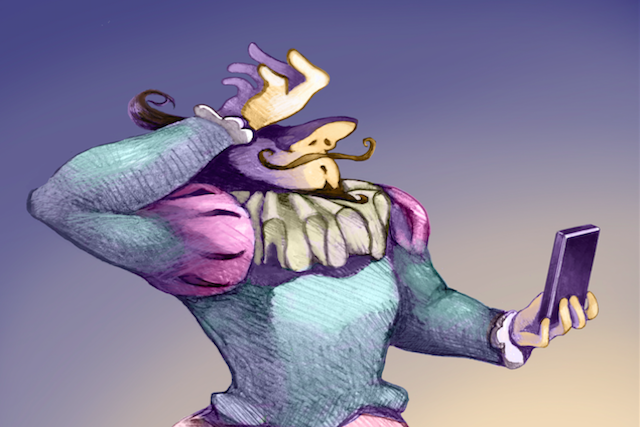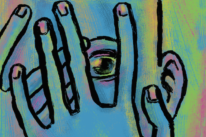
“Be yourself. Life is precious as it is. All the elements for your happiness are already here. There is no need to run, strive, search, or struggle. Just be.” ~ Thich Nhat Hanh
We show off our best moments—another sunshine shot from the beach, big smiles, cocktails and all. We try to be controversial. We ride the wave of the latest trend, showing we’re ‘on point’ and ‘in the know.’ We follow in the slipstream of something clever or enlightened someone else has said, rewording a little as if it’s now ours to own.
We hit send. We repeat.
As social creatures we all have a desire to be social, it’s literally built into our DNA. However, this modern-day version of social is a strange beast. We’ve developed an odd culture of over-sharing. For many of us, this version of social has also become something of a strange quest to be relevant.
The ‘social’ tools that allow us to do this are increasing—Facebook, Twitter, Instagram… the list goes on. They’re getting easier to use. Easier to update. Easier to navigate. Easier to integrate into our day. So much so, they’re becoming a constant part of our days rather than something we use infrequently. They’re no longer seen as something we could be using, but rather something we must be seen to use.
The pull is strong, and getting ever stronger.
The transition has been swift and shows no sign of slowing. If anything, it’s likely to accelerate as the tooling becomes ever more addictive. And make no mistake, it is built to be exactly that.
This culture shift is leading to some peculiar behavior. The young, and not so young, can be found obsessively ‘checking in’ to the online world, while checking out of the place they’re in right now.
What’s This Really All About?
Can we no longer just savor the wonderful meal that’s in front of us without taking multiple pictures, sharing, and hashtagging to oblivion?
Can we not be present in beautiful surroundings without feeling the need to ‘check in’ and let our ‘friends’ know exactly what we’re up to?
I do it, I’m pretty sure you do it too. The question is, why do we do it?
Is it a sense of being relevant we seek? If so, can we not find our sense of self and relevance in other, dare I say, more meaningful ways?
Wouldn’t spending our time and energy invested in meaningful work, trying to solve interesting challenges, give us more of a feeling of relevance than the fleeting endorphin rush of a picture shared on Facebook?
What about being of service to others? Surely this is an area that offers us many opportunities to feel relevant and like we are making a real difference in some small but meaningful way.
Is part of the reason we seek the mini-dopamine hit we get when we receive a ‘like’ on our latest picture shared online because we struggle to stay present in what we are doing right now offline? Perhaps that’s an indication we should try to find something else (offline) that does hold our attention, rather than seeking escape in the digital world reflexively. Would this not give us more back?
Balancing the Tension (A Personal Example)
In no way do I wish to delude you into thinking I’m immune to the pull of this behavior.
I have, and continue to, leverage social tools—mainly to publicize my writing and books. I will often share an inspiring quote (from someone else most often) and the odd peak into what I’m up to as well.
Over the years, I’ve gone through times when I’ve picked up my phone a little too much to share and/or check in. As a direct result, I’ve missed out on the magic of the moment in front of me, and have even been negligent of the people that mean most to me by not giving them my full attention when they needed it.
I’ve become much more aware of this, and try to fight it, but the pull is still strong.
Some useful habits that have helped me personally include applying constraints to what I use and how often I allow myself to use it.
For example, while I have tried pretty much all the social platforms at some point in time, I have now settled on using Twitter almost exclusively for my writing-related updates and Facebook for less frequent social sharing.
I also use both tools, and Instagram (although I have no account as of writing), to follow some people I admire and appreciate. Not all of these are people I know directly, but all add something to my life through their work and words. They are inspirations. I am very selective in the feeds I do choose to follow.
I also apply constraints to when I check in. I try to give myself a few small pockets of time through the course of the day or week where I can share a tweet, or check what my feed (of people I follow) is up to. Otherwise, I try to stay out.
I try to objectively look at what I am sharing and ask myself an important question: Why am I sharing this?
If it’s to bolster my ego or show off even, maybe I’d be better off not sharing.
If it’s to be of service in some small way, maybe that’s a good reason to share.
If it’s to share something I’m excited about, maybe that’s okay as well.
Maybe it’s even okay to publicize some of my work, as long as that does not slip into heavy-handed sales pitches (we all hate those).
I find it helps to ask myself if, subconsciously, there’s something deeper I’m seeking by sharing—for example, an emotional connection, the feeling of being seen and valued, the desire to feel special. Sometimes I just feel the very human need to be appreciated.
What all of this comes down to is trying to be mindful. Thinking intrinsically, and also extrinsically, about why we do what we do and the impact our behavior may have. This of course, is easily said but not so easy to do. It’s how we should be living our lives, with mindfulness.
Strange Times
There is a malfunction. Over-sharing is not the best kind of sharing. Sometimes when we try hard to connect with other people we lose our connection to ourselves. And even worse, when we chase an audience (and their ‘likes’), we inevitably end up performing instead of simply being ourselves.
And then there’s the impact on the people we’re sharing with: Bombarding our friends with our opinions might not be all that friendly when you think about it, especially when it leads to heated debate.
These are strange times. We have truly wonderful technology at our fingertips that we are choosing to use in some not-so-wonderful ways. We should be more connected than ever, but there is actually a real disconnect brewing.
Our lazy and misinformed online habits can even slip into our real-world encounters. We talk in text-speak, we look for our platform of relevance, we tell anyone that cares how busy (and, by proxy, important) we are.
Isn’t this all sliding a little toward the ridiculous?
Is this any way to live our precious lives?
A Call to Action
This isn’t an anti-technology, or even an anti-social media, piece. We can use and enjoy both if we choose to. This is a prod at our obsessive need to be heard, in a world that is only going to get louder and more crowded. A poke at what can only become a race to the bottom.
We can choose to walk a different path.
We can be more selective in what we share, how we share it, and whom we share it with. We can think longer and harder before we hit send or ‘check in.’ We can get back in touch with the beauty and purity of being present in this moment, with what and who is actually in front of us.
Let’s reconnect the dots on what it means to be relevant.
Does the number of likes online really count for anything meaningful in the grand scheme of things, or are there better measures of a life well lived?
What about committing to being a better lover, a better friend, a better neighbor? What about trying to leave positive footprints in this world with acts of kindness? What about trying to find our point of highest contribution through our work and the way we act?
Let’s think and act bigger. Let’s live bigger. Let’s leverage the wonderful technology around us in new, interesting, and useful ways.
Let us function optimally by sharing appropriately and being happy with our place in the world. Let us be happy and content that we are already relevant enough.
About Carl Phillips
Carl writes short books full of big ideas. He is also the proud owner of Frictionless Living which is focused on helping readers find and live their own version of a simpler, good, life.













 Though I run this site, it is not mine. It's ours. It's not about me. It's about us. Your stories and your wisdom are just as meaningful as mine.
Though I run this site, it is not mine. It's ours. It's not about me. It's about us. Your stories and your wisdom are just as meaningful as mine.
This article appeared to me in the correct time! I wanted to disconnect a little bit of sharing just for increasing my ego and my desire to be someone! But with these words i changed my way to see how and why share something in social media!
Love this! I am definitely in the phase of intentional interaction.. ones that add meaning.
Good plan Madeleine and glad you enjoyed the post!